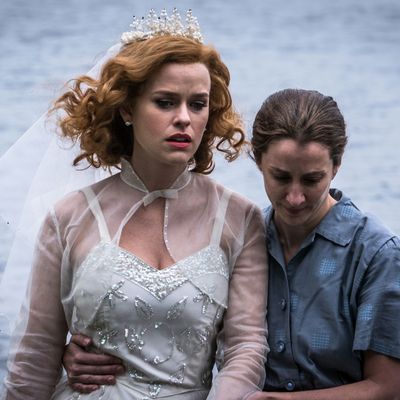
AmazonÔÇÖs three-part Agatha Christie adaptation Ordeal by Innocence feels familiar but also strangely sleek, like an overly enthusiastic restoration of an old building that renders everything too shiny.
The restored building, in this case, is the genre of the country-home mystery, and it appears in Ordeal by Innocence in all its usual ornate, crenellated ornamentation. The home itself is crammed full of formal staircases from which to loom dramatically, hallways where enigmatic housekeepers can creep mysteriously, and closets full of dead bodies both real and metaphorical. The cast of characters include the patriarch and matriarch, the usurping new fiance├®, and the grown children keeping secrets. It even has a murdererÔÇÖs row of stellar British acting talent: Anna Chancellor as Rachel, the monstrous mother; Matthew Goode as Philip, the sardonic brother-in-law; Ella Purnell as Hester, the seemingly sweet daughter; and Bill Nighy as Leo, the cool, reasoned, regretful father.
EverythingÔÇÖs in place for a delicious romp through a murder house. After Rachel is murdered, all evidence points to her son, Jack (Anthony Boyle), as the culprit. His bloody fingerprints are there, so he surely did it! What Ordeal by Innocence asks, inevitably, is┬áwhat if he didnÔÇÖt?
In other words, Ordeal by Innocence will fill your whodunit needs. And itÔÇÖll be lovely to look at in the process, because it is a gorgeous mini-series. (There are shots of Bill Nighy in a lake on a red canoe that IÔÇÖd happily frame as moody inspirational art, and there are shots of Matthew Goode exercising that could also be described as inspirational.) But those lovely surfaces arenÔÇÖt anchored to a propulsive enough story, so when it tries to polish, complicate, and heighten the usual Christie tropes ÔÇö the flashbacks, the looping story structure, and the fascination with beautiful images of dripping blood and foreshortened statuary ÔÇö the whole thing feels overwrought.
Part of the problem is the characters, who are almost uniformly unappealing. Of course, this doesnÔÇÖt have to be a problem: The usual point of a Christie murder story is to trap everyone in a house and then reveal how damaged and cruel they all are, so that the whole house seems like a wrongness that needs righting. Each of the characters might be the real killer, and the victim seems to deserve it. In the best Christie adaptations ÔÇö┬álike the BBCÔÇÖs 2015 version of And Then There Were None┬áÔÇö this creates a sickening, slowly creeping, inescapable spiral of tragedy. But Ordeal by InnocenceÔÇÖs pace never lets you settle into the doom. Every time you get close, youÔÇÖre catapulted back in time to consider some new indignity, some new personal trauma.
The whole mini-series is under three hours, and itÔÇÖs not as though Ordeal by Innocence needs to sustain dozens of separate plot threads, but itÔÇÖs hard not to wish it would linger on its performances a little longer. The strongest moments are the scenes that sit through full conversations between characters without immediately cutting away to yet another flashback ÔÇö the ones that embrace Bill NighyÔÇÖs coolly creepy intonation, or Anna ChancellorÔÇÖs weaponized condescension. The series needs more of those moments and less scattershot images of a car on a foggy night.
Unfortunately, the best part of Ordeal of Innocence is also the part I canÔÇÖt tell you about. The conclusion feels gutsy and right, and itÔÇÖs also a markedly different ending than the one Christie wrote for her original 1958 novel. ItÔÇÖs not just a stronger, more interesting twist for the whole story, itÔÇÖs also a good example of how invigorating it can be to update ChristieÔÇÖs stories rather than treating them as untouchable.
Its highlights and flaws aside, Ordeal by Innocence is the kind of mini-series that you already know whether youÔÇÖre going to enjoy or not. Country-house murder? Bill Nighy? Matthew Goode doing intensive upper body workouts and then putting on period clothing and eviscerating everyone with his words? ItÔÇÖs all there, even if it feels sleek enough to slide away. Until, at least, it wallops you with a vicious, surprising ending.


